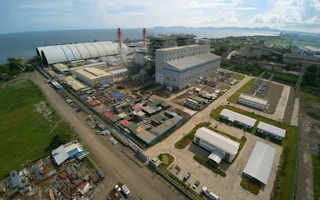Philippine conglomerate Ayala Corp has pledged to bring down its greenhouse gas emissions to net zero by 2050 in line with climate science, its president and chief executive Fernando Zobel de Ayala announced on Thursday.
To continue reading, subscribe to Eco‑Business.
There's something for everyone. We offer a range of subscription plans.
- Access our stories and receive our Insights Weekly newsletter with the free EB Member plan.
- Unlock unlimited access to our content and archive with EB Circle.
- Publish your content with EB Premium.
“As a diverse group of companies in strategic industries, we believe that we have the capabilities and collective will to make this happen. To achieve net zero by 2050, we will build on existing projects as well as explore many new ones that are relevant and appropriate,” Zobel said in Ayala’s Integrated Corporate Governance, Risk Management, and Sustainability Summit, held virtually.
“Due to Ayala’s diversity, we foresee that each business unit will have its own net-zero path, which will be refined and validated regularly. We intend to have interim targets to achieve before the 2050 deadline,” he added.
Zobel said the firm will be partnering with South Pole, a Switzerland-based carbon finance consultancy, to get an accurate view of emissions across its core business units and a tangible roadmap for reducing them in line with its climate ambition.
In the next 12 months, South Pole will help Ayala develop a detailed greenhouse gas footprint that includes its direct and indirect emissions from controlled sources as well as those that occur in its value chain, budget for these interventions across its core business units, and establish interim targets aligned with a science-based target.
Zobel cited how the conglomerate has already made “significant moves” towards the net zero target including how its power arm AC Energy will begin supplying solar power to commercial properties of real estate subsidiary Ayala Land until 2050. Electricity will be sourced from AC Energy’s 120 megawatt (MW) solar plant in Alaminos, Laguna.
AC Energy also granted authority to management to work towards the early retirement of the South Luzon Thermal Energy Corp (SLTEC) coal facility by 2040 or 15 years ahead of its technical life, added Zobel.
SLTEC will be transitioned to cleaner technology through the use of Energy Transition Mechanism (ETM), an innovative funding mechanism that leverages low-cost and long term funding geared towards early coal retirement and reinvestment of proceeds to enable renewable energy.
AC Energy’s board appointed Ayala-led Bank of the Philippine Islands (BPI) as lead arranger for the ETM of SLTEC, which owns the 275MW coal-fired power plant in Calaca, Batangas.
The power firm likewise announced in a disclosure on Tuesday that it was moving to fully acquire UPC\AC Renewables Australia, after its management has cleared the decision to buy the remaining stake of its joint venture partners in the foreign company, raising its ownership in the renewables development platform to 100 per cent.
Prior to Ayala’s net zero by 2050 announcement, its telecommunications subsidiary Globe Telecom pledged in July net zero emissions within the same time frame under the Science-Based Targets Initiative (SBTi), a non-profit that helps companies translate the Paris Agreement’s goal into concrete measures. The Paris accord aims to limit global warming to 1.5 degrees Celsius compared to pre-industrial levels.
AC Energy announced last year that it will make a full coal exit by 2030, while BPI said in April that it is eyeing to reduce by half the amount of its financing for coal power-fired plants in the next five years.










